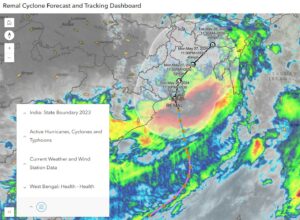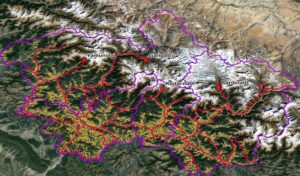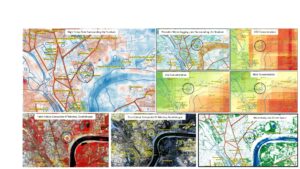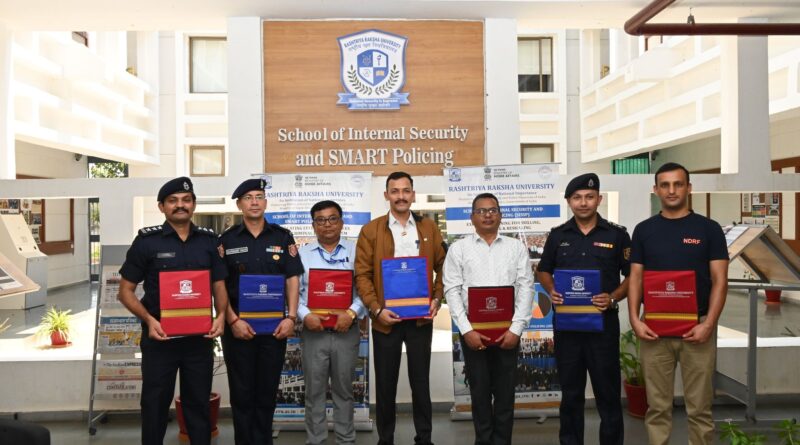RRU launches Innovative Cyclone Tracking Dashboard to Enhance Disaster Resilience in India
BILKULONLINE
Ahmedabad, June 9: Disasters are one of the major challenges for progressive nations like India in this era of climate change and global warming. To achieve the economic aspirations and make India a developed nation by 2047, one of the key focuses of the government should be on building a disaster resilient nation. This can be accomplished by adopting a technology-driven, proactive multi-hazard, and multi-sectoral strategy for building a safer, and resilient India.

The Center for Disaster Risk Reduction (CDRR), the School of Internal Security and SMART Policing (SISSP) at Rashtriya Raksha University, under the Ministry of Home Affairs, Govt. of India, is actively engaged and working on the mandate in addressing various facets of natural and anthropogenic disasters. The center endeavors to offer a platform for exploring the tech-driven multifaceted implications of disasters on national security, with the objective of examining the research findings that delve into the diverse impacts of disasters on security frameworks nationally and globally.

Acting as a knowledge platform and decision support system to fulfill the needs of the government in wider aspects related to disaster, the Center for Disaster Risk Reduction (CDRR) developed the “Remal Cyclone Forecast and Tracking Dashboard”. This innovative tool is designed to provide indispensable support to key relief and rescue agencies such as the NDRF, SDRF, CAPF officials, and various decision-making bodies in navigating the challenges posed by the recent cyclonic storm, Remal.
A severe tropical cyclonic storm ‘Remal’ originated from the Bay of Bengal, the first cyclone of this year, initiated its landfall between Sagar Island in West Bengal and Khepupara in Bangladesh at approximately 9:15 p.m. on Sunday, gained its strength as progressed northward. By approximately 11:30 p.m., the cyclone’s eye made contact with the landmass. The cyclone reached speeds of approximately 135 kmph (84 mph) and caused widespread damage, especially in the coastal areas of West Bengal.
The tracking dashboard developed by the center fetches satellite images from the National Oceanic and Atmospheric Administration (NOAA), Advanced Baseline Imager (ABI) Radiance (sensed by GOES series and JMA Himawari satellite) for cloud top temperature. The image updates to the most recent image every 10 minutes at 1.5 km per pixel resolution. Additionally, the tracking layer is created from hourly METeorological Aerodrome Report (METAR) and buoy data provided by NOAA that also depicts wind speed and direction. The data, integrated with insights from the National Hurricane Center (NHC) and Joint Typhoon Warning Center (JTWC), offers real-time forecasts for Cyclone paths. The Cyclone dashboard is hosted on ESRI’s free dashboard application. Its intuitive interface and dynamic features empower stakeholders, including regional authorities, communities, and governmental bodies, with actionable insights for effective disaster preparedness and response. It also supports stakeholders with actionable data for effective disaster preparedness. With this, CDRR is committed to advancing hazard monitoring and enhancing resilience to play a pivotal role in safeguarding lives and enhancing national security.

The center is currently working on some other contemporary challenges from disaster and early warning-related projects such as high-resolution Chardham landslide risk assessment, crafting of data-driven hazard mapping for Narendra Modi stadium, earth-observation based multiscale sensing of small-scale croplands, and others. Decorated with its geospatial capabilities, the center also works on SMART policing projects on crime and hotspot mapping, spatiotemporal crime data inventory, optimizing surveillance management strategies, and predictive policing etc. in parallel.
Following the successful completion of a three-month Disaster Risk Reduction and National Security certificate course for in-service executives of NDFR and PSU officials, the Center for Disaster Risk Reduction is expanding its educational offerings. Since this current academic year, the center offers two master’s and one PhD programme in the field of disaster and national security namely, MA/M.Sc. in Disaster Management and National Security, M.Tech. in Disaster Management and National Security, and PhD in Disaster Management in regular and practitioner mode. Admission for the master’s programmes is open till 7th July, 2024. The center is actively involved in providing consultancy services and capacity-building training as well.
give two headlines



